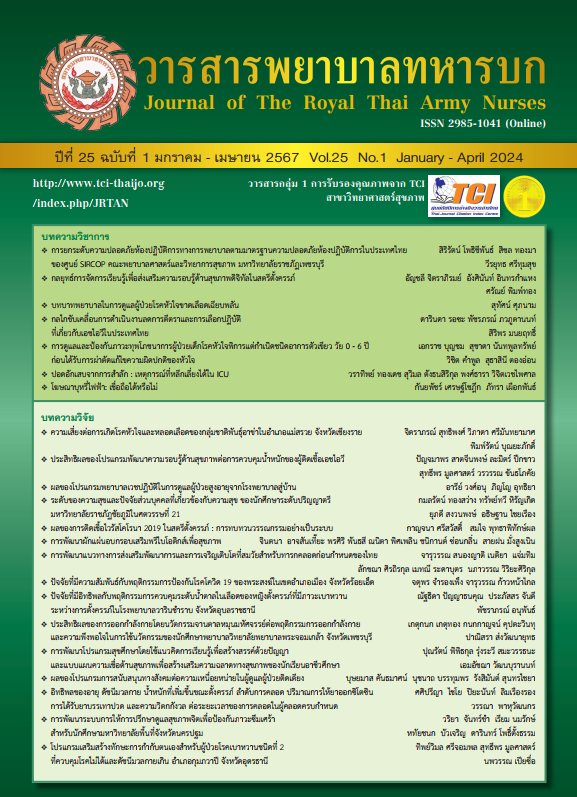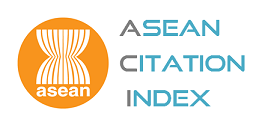ผลของโปรแกรมการส่งเสริมความรอบรู้ด้านอาหารต่อพฤติกรรมการ บริโภค และระดับ HbA1C ในผู้สูงอายุที่เป็นโรคเบาหวานชนิดที่ 2 ที่ควบคุมระดับน้ำตาลในเลือดไม่ได้
คำสำคัญ:
ความรอบรู้ด้านอาหาร, ผู้สูงอายุที่เป็นโรคเบาหวานชนิดที่ 2, พฤติกรรมการบริโภค, ระดับน้ำตาลสะสมในเลือดบทคัดย่อ
การศึกษากึ่งทดลองแบบ 2 กลุ่มวัดผลก่อนและหลังการทดลอง มีวัตุประสงค์เพื่อศึกษาผลของโปรแกรมการส่งเสริมความ รอบรู้ด้านอาหารต่อพฤติกรรมการบริโภคและระดับ HbA1C ในผู้สูงอายุที่เป็นโรค DM Type 2 ที่ควบคุมระดับน้ำตาลในเลือดไม่ได้ กลุ่มตัวอย่างเป็นผู้สูงอายุที่เป็นโรค DM Type 2 ที่ไม่สามารถควบคุมระดับน้ำตาลในเลือดได้จำนวน 54 ราย แบ่งเป็น กลุ่มทดลอง 27 ราย และกลุ่มเปรียบเทียบ 27 ราย เครื่องมือที่ใช้ในการศึกษาประกอบด้วย เครื่องมือในการทดลองคือโปรแกรมการส่งเสริม ความรอบรู้ด้านอาหาร เครื่องมือในการรวบรวมข้อมูลประกอบด้วย แบบสอบถามพฤติกรรมการบริโภคอาหารในผู้สูงอายุที่เป็นโรค เบาหวานชนิดที่ 2 วิเคราะห์ข้อมูลด้วยสถิติ ได้แก่ Paired t – test , Independent Sample t – test, Chi – Square test และ Fisher’s Exact test
ผลการศึกษาพบว่าภายหลังได้รับโปรแกรมกลุ่มทดลองมีคะแนนเฉลี่ยพฤติกรรมการบริโภคเพื่อควบคุมระดับน้ำตาล ในเลือดสูงกว่ากลุ่มเปรียบเทียบอย่างมีนัยสำคัญทางสถิติ (p <.001) และกลุ่มทดลองมีระดับน้ำตาลสะสม (HbA1C) ลดลงอยู่ใน ระดับที่ควบคุมได้ ดีกว่าก่อนเข้าร่วมโปรแกรม และกลุ่มเปรียบเทียบ อย่างมีนัยสำคัญทางสถิติ (p <.001)
จากผลการวิจัยควรส่งเสริมให้เกิดความรอบรู้ด้านอาหารในผู้สูงอายุที่เป็นโรคเบาหวานชนิดที่ 2 เพื่อพฤติกรรมการรับ ประทานอาหารที่ดีขึ้น ส่งผลให้ควบคุมระดับน้ำตาลในเลือดได้ด
Downloads
เอกสารอ้างอิง
Bunnag S, Aekplakorn W, Treeyamaneerat K, Pansila N. Analysis of Health Status, Burden of Disease and Health Service Needs in Thai Elderly. 2020.(in Thai).
Boyko E, Magliano D, Karuranga S, Piemonte L, Riley P, Saeedi P, et al. International Diabetes Federation.IDF Diabetes Atlas 10thedition. 2021.
Aekplakorn W, Puckcharern H, Satheannoppakao W. Report on the Thai People’s Health Survey by Physical Examination. 2020. (in Thai).
Diabetes Association of Thailand under The Patronage of Her Royal Highness Princess Maha Chakri Sirindhorn. Clinical Practice Guideline for Diabetes. 2017. (in Thai).
Phungdee T, Sirisopon N. Diet Consumption Behavior Modification to Control Blood Sugar Levels of Type 2 Diabetes Mellitus Patients. Journal of The Royal Thai Army Nurses. 2022;23(3):48–54.(in Thai).
Kawitu K, Mattavangkul C. Factors Associated with Blood Sugar Controlling Among The Elderly with Diabetes, Living in Communities Nearby Siam University. Journal of Nursing Siam University. 2019;20(38):82–95.(in Thai).
Julsulkon A, Piaseu N, Thipsuwannakool V, Lininger J. Nutrition Literacy and Health Outcomes in Older Adults with Type 2 Diabetes. Journal of Thailand Nursing and Midwifery Council. 2019;34(4):120–35.(in Thai).
Miller KC, Edwards L, Kissling G, Sanville L. Nutrition Education Improves Metabolic Outcomes among Older Adults with Diabetes Mellitus: Results from a Randomized Controlled Trial. 2002;34(2):252–9.
Saman AH, BarakatunMY, Hazizi AS, Suriani I, Osama H, Abbas M. Effectiveness of simplified diabetes nutrition education on glycemic control and other diabetes-related outcomes in patients with type 2 diabetes mellitus. 2021;45 (1):141-9.
Nutbeam D. Defining measuring and improving health literacy. Health Evaluation and Promotion. 2015; 42(4): 450-6.
Vettori V, Lorini C, Milani C, Bonaccorsi G. Towards the implementation of a conceptual framework of food and nutrition literacy: Providing healthy eating for the population. In International Journal of Environmental Research and Public Health. 2019;16(24):1-21.
Mangklakeree N, Mangklakeree T. Telehealth : Alternative Self-Management Promotion in People with Diabetes During Covid Pandemic. Journal of The Royal Thai Army Nurses. 2023;24(2):1–9.(in Thai).
Srisatidnarakul B. The methodology in nursing research. 5th edition. You and I intermedia ; 2010. (in Thai).
Silk K, Sherry J, Winn B, Keesecker N, Horodynski M, Sayir A. Increasing nutrition literacy; testing the effectiveness of print. Journal of Nutrition Education and Behavior. 2008;40(1):3-10.
Savarese M, Sapienza M, Acquati GM, Nurchis MC, Riccardi MT, Mastrilli V, et al. Educational interventions for promoting food literacy and patient engagement in preventing complications of type 2 diabetes: A systematic review. Journal of Personalized Medicine. 2021; 11(8):1-22.
Nitiwat S, Tansakul S, Therawiwat M, Imamee N. Factors Related to Food Consumption Behavior with Type 2 Diabetes Patients. Journal of Health Education.2015;38(129): 14–30. (in Thai).
ดาวน์โหลด
เผยแพร่แล้ว
รูปแบบการอ้างอิง
ฉบับ
ประเภทบทความ
สัญญาอนุญาต
ลิขสิทธิ์ (c) 2024 วารสารพยาบาลทหารบก

อนุญาตภายใต้เงื่อนไข Creative Commons Attribution-NonCommercial-NoDerivatives 4.0 International License.
บทความหรือข้อคิดเห็นใดใดที่ปรากฏในวารสารพยาบาลทหารบกเป็นวรรณกรรมของผู้เขียน ซึ่งบรรณาธิการหรือสมาคมพยาบาลทหารบก ไม่จำเป็นต้องเห็นด้วย
บทความที่ได้รับการตีพิมพ์เป็นลิขสิทธิ์ของวารสารพยาบาลทหารบก
The ideas and opinions expressed in the Journal of The Royal Thai Army Nurses are those of the authors and not necessarily those
of the editor or Royal Thai Army Nurses Association.







